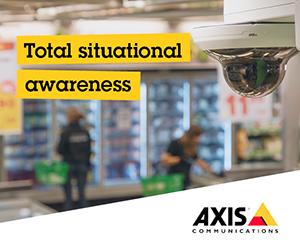DESIGNING OUT CRIME
Robocop or Roboshops?
By John Wilson, Executive Editor
The year is 2028, and law enforcement has lost control of the crime-ridden streets. The solution to this dystopian vision comes in the form of Omni Consumer Products, a fictional private-sector company creating cyborg "half robot, half human" Police officers.
This is the synopsis of the 1988 Paul Verhoeven film Robocop where a critically wounded Police officer is brought back from near death to become a robotic law enforcer with enough awesome fire power to take out the bad guys who run the city in the vacuum created by the absence of law and order. This iconic Judge Dread-like comic book character, who was rebooted again in a 2014 remake as another warning that the fiction was actually closer to "faction", was redeemed by fragmented flashback memories of his previous sentient existence to offer the viewer a glimmer of fragility that there is still hope for humanity before cinema goers return home to start building their own private arsenals because of a coming Armageddon.
We are about to enter 2020, only eight years before the setting of the original Robocop, and flesh has been put on the skeletal frame of this Orwellian vision. We are not quite at the mercy of armed and dangerous criminal militias roaming the streets, but we live in troubled times, and Police forces are increasingly saying that their budget restraints caused by years of austerity mean an even thinner blue line on the UK's streets and the loud and clear message that they simply cannot be everywhere.
Priorities drive policing, and key performance indicators (KPIs) are determined force by force. However, the one consistently missed KPI is the failure to seriously tackle business crime, despite the fact that it alone generates the wealth that feeds the Exchequer (the Treasury) that funds local authorities that in turn pays Police officer salaries, as well as creating the jobs and incomes of millions of law-abiding citizens so that they can pay their mortgages and rents and spend their hard-earned disposable incomes in the retail sector.
Retail is the visible face of this conspicuous consumerism, with shiny stores and online and omni-channel offerings, the presence of which offer rich pickings for non-paying customers, malicious refunders, burglars, armed robbers, internal thieves, organised retail crime gangs, and fraudsters, all of whom account for a large proportion of the business crime reported or, more likely, unreported in today's febrile environment. This latter phenomenon is because, despite the severity of the offence (the increasing use of violence and carrying of offensive weapons, for example) a narrative persists, one that is not discouraged by Police forces, that retailers need to do more to protect themselves because they are creating many of their own problems. This is often conflated with another piece of urban mythology that it is simply the cost of doing business or that violence, or the threat of assault, is just an inevitable part of the day-to-day job.
With a conservative figure of £4 billion worth of annual losses, depending upon which research you read, retailers have invested tens of millions of pounds in guarding, store detectives, CCTV, analytics, facial recognition technology, date mining, compliance, and conflict resolution coaching, not to mention the cost of replacing lost staff due to stress and the well-being counselling industry that has mushroomed as a result of verbal and physical abuse in stores. In addition, they have invested millions in BID (Business Improvement District) levies and town centre crime reduction partnerships and engaged with data-sharing platforms to identify persistent and prolific criminals targeting their businesses, while at the same time ensuring they operate within the strict remit of the new GDPR regulations, breach of which runs the gauntlet of fines equating to a maximum eye-watering 4 per cent of their global turnover. And this is not all about big city retail crime; so much of it goes unreported or does not make headlines anymore.
The Dystopian Present
Forget the dystopian vision of 2028 Detroit; welcome to 2020 Britain. Picture Shipston-on-Stour, a leafy town on the border of Warwickshire and Oxfordshire in what many would regard as the picture postcard British countryside with its world-famous honey-coloured brickwork quarried in the nearby Cotswolds. In 2018, this rural tranquility was shattered when criminals using a stolen JCB digger ripped an ATM out of the wall of the local Co-op before making their escape with the cash machine in the digger bucket. The machine was later recovered with the cash inside, because the ATM was well protected. The town, however, did not fare so well. The criminals not only had ripped the ATM out of the wall but also had torn out the heart of the south Warwickshire community. Such was the damage to the shopfront, it took several weeks for the store to properly reopen, and hundreds of shocked residents had to travel to nearby Stratford-upon-Avon or neighbouring villages to shop, visit the post office, or simply access cash, luxuries that many city dwellers take for granted.
This is a microcosm of wider malaise in small rural communities. Such attacks displaced or inconvenienced 20 million Britons in the last year, according to a report from cash machine specialist Cardtronics, who also said that attacks on ATMs increased by 22 per cent over the last four years and are far from victimless crimes. Cash machines pump £1.6 billion into the UK economy, and as much as £110 million of direct spending from ATMs is put at risk each year from such attacks. The report says that it can take up to five months for an ATM to be replaced with an average £40,000 reduction in direct sales from the loss of one machine. Furthermore, the current rate of cash machine raids will put almost six million shopping trips at risk and negatively impact 13.5 million ATM transactions that would otherwise have been made.
According to the company, 20 million Britons would have to shop elsewhere because of the spike in ATM crime, and it further predicts that such attacks are likely to triple in the next five years unless vital action is taken to tackle the problem. To tackle the issue, it launched a five-point manifesto that called for a zero-tolerance approach to ATM crime and harsher penalties for perpetrators who would be classified as serious and organised criminals, rather than petty thieves. Point four of this manifesto called for mandatory surveillance equipment at stores to evidence ATM crime and more vigilance from the local community.
In addition, thieves are increasingly trying to smash or blast their way into cash machines, the number of attacks on ATMs nearly doubling in four years. Attempts to steal cash have risen from 400 attacks in 2014 to 723 last year, according to the report by Cardtronics, which said that one in five incidents in Europe occurred in the UK. Thieves are generally unsuccessful, with 41 per cent of cases resulting in cash being stolen.
"For the first time, we have proof that the wider damage caused by these attacks is far greater than the direct impact to cash machines or the buildings they are in. ATM attacks are not victimless crimes," said Tim Halford, managing director of Cardtronics UK and Ireland.
The report suggested that nearly half of all attacks could be considered as dangerous, in that heavy force was used. This could include ram-raids and gas explosions to blast out the ATM. These "dangerous" attempted thefts have risen from an estimated 129 in 2014 to 342 in 2017. Last year, a seven-man gang that blew up cash machines across the UK, stealing hundreds of thousands of pounds, were handed jail sentences ranging from ten years to life imprisonment. Would-be thieves in Liverpool blew up a cash machine but were unable to take any money from it. Other dramatic cases included raiders using gas to blow up a cash machine outside a Matalan store in Darlington last year. The report said industry data showed that in 2018 almost 70 per cent of gas attacks on ATMs took place on petrol station forecourts, adding an extra level of potentially dangerous consequences.
Network coordinator Link has said more than 250 free-to-use cash machines are disappearing a month as operators shut unprofitable ones. There are more than 50,000 free machines in the UK, but the number is shrinking at a record rate as people use less cash.
Robocop
With Police resources thinly stretched, particularly in the rural areas, enter Robocop. Not the Michigan-based cyborg law enforcer immortalised on the silver screen, but the twenty-first century British equivalent, the Vulture Urban Unit (VUU), which is making its debut as part of a wide-ranging trial for Southern Co-op, the society which covers an estate of more than 200 stores across the southeast and west of the UK, excluding Cornwall.
Created by Dorset-based SWL Security as an alternative to high manned-guarding costs that can be generated in the wake of damaging break-ins or ATM raids putting stores at risk for weeks at a time, the VUU is a stand-alone silent-hours protection unit that acts as both a virtual and actual deterrent to returning thieves chancing their arm in the hours and days after an attack while a repair is underway. Offering rapid deployment within hours of a break-in, the VUU provides the store with an eight-channel network video recorder, a multi-position dome IP camera technology to provide Òeyes onÓ evidence of a break-in, a master blaster 127-decibel siren triggered by the alarm receiving centre (ARC), amplifier and loudspeaker to provide audio warnings from the ARC to intruders, a strobe light and smoke cloak, and battery back-up to support the unit should the intruders cut the power to assist their entrance and exit.
The Southern Co-op experienced sixteen serious out-of-hours raids in its store estate between November 2015 and November 2016, and this rose sharply to 125 incidents in the following twelve months, sixty-two of which were burglaries or ram raids. Half of these were repeat visits before the repair could be carried out. The cost of criminal activity had a combined impact of £750,000 during 2017, which included the cost of additional manned guarding, repairs, and structural checks to the integrity of the building fabric in the wake of the brutal attacks.
The society was concerned about the local community requirements and its own brand reputation in the wake of the attacks. The Southern Co-op purchased six VUUs, which are also available to lease, following a trial in the wake of a smash and grab in Romsey, Hampshire. The location was in a new-build residential estate, and there was concern about the householder perception of this negative event and the potential damage to the Co-op's reputation, especially as the store was subjected to a repeat attempt during a two-week period in November 2018.
The first attack, which was a ram raid through the front window, resulted in the theft of tobacco and alcohol and prompted analysis of the CCTV, and the store was boarded up. A vulnerable time for all stores, Southern Co-op decided to invest in the VUU located in the front of the store and supported by CCTV detection and SWL monitoring, as they feared a repeat attack. Sure enough, the criminals did return the following week, but because of the VUU deployment, the white van used was identified outside of the store as one of the vehicle occupants made an approach towards the front, carrying tools to affect another attempt. As the person approached, the VUU was activated and triggered an alarm to the ARC, and the controller deployed a loudspeaker announcement, causing the individual and the other occupants of the van to leave the scene. The cost saving was £7,000 because the society did not have to deploy security guards at this single location.
By the middle of 2018, Southern Co-op deployed the six units over a seven-month period, which had the combined effect of dramatically reducing the repeat offences and the loss of stock as well as meeting insurance requirements. Gareth Lewis, loss prevention and security manager for Southern Co-op, said, "The introduction of the Vulture Unit into our overnight burglary and response toolkit has significantly reduced the historic associated costs. To date, we have not suffered a single case of a store being repeat targeted while the Vulture Unit has been deployed. It can be deployed in a few short hours and acts as a fixed-price asset with a small monitoring fee, as opposed to tens of thousands of pounds we would have to spend on manned guarding."
The VUU, which is awaiting Secured by Design accreditation, was described by Gareth Lewis as a "real success that can be deployed within a few hours." He continued, "We also deploy it in some of our industrial units which are remote, and we have used SmartWater in non-food environments. Its simplicity is in the fact that it is a very overt, stand-alone deterrent." The society is now looking at other benefits of the VUU, which could include daytime use around anti-social behaviour in certain stores.
Bill Collinge, development manager of SWL Security, based in Poole, said the unit saves up to £15 per hour in manned guarding costs which could result in a £1,300 to £1,400 cost saving per week. "It is an alternative to a manned guard for the duration of a store closure for refit post a burglary or ram raid, and it serves as a deterrent for second visits while the store is being resecured," he said. "It helps with compliance with insurance, and the data gathered can be used to compile incident reports and statements. It is there for as long as stores require it, and as soon as the store is properly secured, it is removed at the end of the period."
"We are looking for it to show that our range of Vulture Units are designed and built at our Poole location, thereafter individually supplied, monitored, and responded to from our own alarm receiving centre. We see it as a complete turnkey operation," added Bill Collinge whose company also provides a warden scheme in Sussex, working for the community and funded by Police and Southern Co-op. The company, which works with eleven Business Improvement Districts including Camden, Euston, Wood Green, Bognor Regis, Reading, and Manor Royal in Crawley, is also talking to other retailers to enhance the product.
"We have been very encouraged by this engagement. One retailer suggested using SmartWater to help identify the thieves after the event, which is an idea we had not thought about in phase one of the development," Bill added. SWL Security Services is also a National Business Crime Solution (NBCS) associate member, a partnership that enables it to tap into anonymous intelligence, identifying and mapping the environmental risk.
SWL Managing Director Mark Ferns added, "This relationship provides better advice for our customers as to areas of higher risk so that they can appropriately target harden. SWL is also working together with the NBCS to develop facial recognition technology as part of the Vulture CCTV service. The introduction of the Vulture product, some five years ago, was designed to integrate a technology-based solution that works with our existing security delivery. This was essential to the survival of SWL Security. The industry was changing direction, and we needed to meet the challenges ahead. Importantly, we were attempting to reach businesses that are not in a position to afford manned guarding. The Vulture product reaches those who need the assistance and support, and Urban was designed and built to deliver an end-to-end service."
Innovation Saves the Day
We are not at the stage where real life Robocops are wandering the suburban streets of our towns, cities, and villages, but there is little doubt that technology is filling a vacuum created by an absence of uniformed Police officers. Despite reassurances that Police numbers are increasing with a pledge to recruit 20,000 more officers, the reality is that with 25,000 officers due to retire over the same time frame, forces will need to attract more than double the number of recruits to get back to pre-2009 levels.
As necessity is the mother of invention, technologies such as the VUU are making giant strides in reducing the need for expensive security investments and are only engaging with limited Police resources when there is a need. This means where there is clear evidence of physical attacks on stores after the unit has deterred a secondary break-in through a series of warnings, alarms, and other distractions, including the deployment of smoke cloaks to disorientate intruders, it has also gathered sufficient evidence to identify the perpetrators so as to successfully discourage reoffenders through fear of identification.





